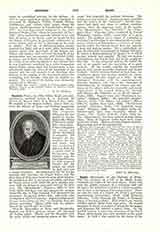

Segneri, PAOLO, the elder, Italian Jesuit, preacher, missionary, ascetical writer, b. at Nettuno, March 21 (cf. Massei) 1624; d. at Rome, December 9, 1694. He studied at the Roman College, and in 1637 entered the Society of Jesus, not without opposition from his father. The eloquent Oliva was his first master in the religious life; Sforza Pallavicini taught him theology. Under such guides his virtues and talents developed to maturity. He lectured on humanities for several years, and was ordained priest in 1653. By a careful study of Scripture, the Fathers, and the Orations of Cicero, he had prepared himself for the pulpit, for which he had ever felt a strong attraction. He volunteered for the foreign missions, but Tuscany, the Papal States, and the chief cities of Italy were to be the scene of his labors. He preached at first in the great cathedrals, and then for twenty-seven years (1665-92) gave popular missions with an eloquence surpassed only by his holiness. His “Quaresimale” (Florence, 1679, tr. New York, 1874) had been read and admired by Antonio Pignatelli, who as Pope Innocent XII summoned the missionary to preach before him, and made him theologian of the Penitentiaria. Segneri’s biographer, Massei, states distinctly that “Le Prediche dette nel palazzo apostolico” (Rome, 1694) won the admiration of the pontiff and his Court.
After St. Bernardine of Siena and Savonarola Segneri was Italy‘s greatest orator. He reformed the Italian pulpit. Marini and the Marinisti with the petty tricks and simpering graces of the “Seicento” had degraded the national literature. The pulpit even was infected. Segneri at times stumbles into the defects of the “Seicentisti”, but his occasional bad taste and abuse of profane erudition cannot blind the impartial critic to his merits. The “Quaresimale”, the “Prediche”, the “Panegyrici Sacri” (Florence, 1684, translated by Father Humphrey, London, 1877), stamp him as a great orator. His qualities are a vigor of reasoning, a strategist’s marshalling of converging proofs and arguments, which recall Bourdaloue; a richness of imagination which the French Jesuit does not possess; a deep and melting pathos. He is particularly co-gent in refutation; to harmony of thought and plan, he unites a Dorian harmony of phrase; he is full of unction, priestly, and popular. He has two sources of inspiration, his love of God and of the people before him. To his oratorical powers, he added the zeal of an apostle and the austerities of a great penitent. All this readily explains his wonderful success with people naturally emotional and deeply Catholic. Entire districts flocked to hear him; extraordinary graces and favors marked his career. His triumphs left him simple as a child. In his theological discussion with his superior-general, Thyrsus Gonzalez, who was a firm champion of Probabiliorism, he combined the respect and obedience of the subject with the reasonable and manly independence of the trained thinker (cf. “Lettere sulla Materia del Probabile” in vol. IV of “Opere”, Venice, 1748). Segneri wrote also “Il penitente is-. truito” (Bologna, 1669); “Il confessore istruito” (Brescia, 1672); “La Manna dell anima” (Milan, 1683, tr. London, New York, 1892); “Il Cristiano istruito” (Florence, 1686); “L’ Incredulo senza scusa” (Florence, 1690). His complete works (cf. Sommervogel) have been frequently edited: at Parma, 1701; Venice, 1712-58; Turin, 1855, etc. The “Quaresimale” has been printed at least thirty times. Some of Segneri’s works have been translated into Arabic. Hallam criticizes Segneri unfairly; Ford is more just in his appreciation.
JOHN C. REVILLE

